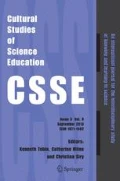Abstract
As a response to Fortney and Atwood’s “Teaching with understanding while teaching for understanding” (this issue), this paper challenges definitions of equity that do not explicitly deal with oppression and injustice. I argue that in order to address the problem of inequity at its roots, we must re-center the historical, political, and moral dimensions of equity to disrupt dominant assumptions about the goals of science education. The justice-centered approach I advocate requires understanding inequity as one component of social injustice and necessitates that science education be linked with larger movements for social change.
Similar content being viewed by others
References
Anyon, J. (1980). Social class and the hidden curriculum of work. Journal of Education, 162(1), 67–92. https://doi.org/10.1177/002205748016200106.
Apple, M. W. (2004). Ideology and curriculum (3rd ed.). New York: Routledge Falmer. https://doi.org/10.4324/9780203487563.
Bang, M., & Vossoughi, S. (2016). Participatory design research and educational justice: Studying learning and relations within social change making. Cognition and Instruction, 34(3), 173–193. https://doi.org/10.1080/07370008.2016.1181879.
Bowles, S., & Gintis, H. (1976/2011). Schooling in capitalist America: Educational reform and the contradictions of economic life. Chicago: Haymarket Books.
Conner, C. (2005). A People’s history of science: Miners, midwives, & low mechanicks. New York: Nation Books.
Gutierrez, R. (2018, July 17). Re(humanizing) STEM education. Plenary lecture given at the Noyce Summit in Washington D.C.
Gutiérrez, R. (2016). Strategies for creative insubordination in mathematics teaching. Teaching for Equity & Excellence in Mathematics, 7(1), 52–60.
Loyson, P. (2011). Chemistry in the time of the Pharaohs. Journal of Chemical Education, 88(2), 146–150. https://doi.org/10.1021/ed100492a.
Morales-Doyle, D. (2017). Justice-centered science pedagogy: A catalyst for academic achievement and social transformation. Science Education, 101(6), 1034–1060. https://doi.org/10.1002/sce.21305.
Morales-Doyle, D. (2018). Students as curriculum critics: Standpoints with respect to relevance, goals, and science. Journal of Research in Science Teaching, 55, 749–773. https://doi.org/10.1002/tea.21438.
Morales-Doyle, D., & Gutstein, E. (in press). Racial capitalism and STEM education in Chicago Public Schools. Race Ethnicity and Education.
Morales-Doyle, D., Varelas, M., Segura, D., Bernal-Munera, M., & Mitchener, C. (2017). Sociopolitical understandings and the structure-agency dialectic in science teacher preparation. Paper presented at the annual international conference of NARST, San Antonio, TX.
Spring, J. (2003). Deculturalization and the struggle for equality: A brief history of the education of dominated cultures in the United States. New York: McGraw-Hill.
Vossoughi, S., & Vakil, S. (2018). Towards what ends? A critical analysis of militarism, equity, and STEM education. In A. Ali & T. Buenavista (Eds.), Education at war: The fight for students of color in America’s public schools. New York: Fordham University Press. https://doi.org/10.2307/j.ctt2204pqp.9.
Watkins, W. (2001). The white architects of Black education. New York, NY: Teachers College Press.
Watkins, W. H. (1993). Black curriculum orientations: a preliminary inquiry. Harvard Educational Review, 63, 321–338. https://doi.org/10.17763/haer.63.3.26k2433r77v631k2.
Author information
Authors and Affiliations
Corresponding author
Additional information
Publisher's Note
Springer Nature remains neutral with regard to jurisdictional claims in published maps and institutional affiliations.
Lead Editors: B. Fortney and B. Upadhyay.
This review essay addresses issues raised in Brian Fortney and Erin Atwood’s paper entitled: Teaching with understanding while teaching for understanding (https://doi.org/10.1007/s11422-019-09924-z).
This manuscript is part of the special issue Equity in Science Teacher Education: Toward an Expanded Definition, guest edited by Brian Fortney, Deb Morrison, Alberto J. Rodriguez, and Bhaskar Upadhyay.
Rights and permissions
About this article
Cite this article
Morales-Doyle, D. There is no equity in a vacuum: on the importance of historical, political, and moral considerations in science education. Cult Stud of Sci Educ 14, 485–491 (2019). https://doi.org/10.1007/s11422-019-09925-y
Received:
Accepted:
Published:
Issue Date:
DOI: https://doi.org/10.1007/s11422-019-09925-y


